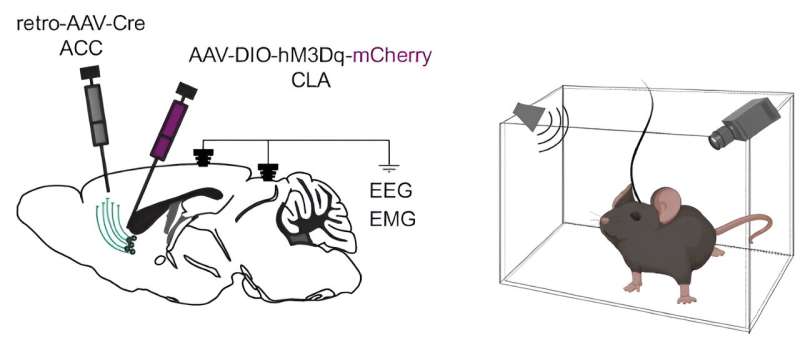This article has been reviewed according to Science X's editorial process and policies. Editors have highlighted the following attributes while ensuring the content's credibility:
fact-checked
peer-reviewed publication
trusted source
proofread
Study shows activity of claustrum neurons controls alertness level, engagement of sensory information

A new study has uncovered the pivotal role of a brain structure called the claustrum in regulating engagement, from deep sleep to waking behavior.
The research paper, titled "Claustrum Neurons Projecting to the Anterior Cingulate Restrict Engagement During Sleep and Behavior," is published in Nature Communications.
The findings shed new light on how our brains control responsiveness to sensory stimuli, potentially revolutionizing our understanding of attention, impulse control, and even sleep disorders.
The researchers recorded the activity of neurons in the claustrum of mice during an attention-demanding task. They discovered that increased activity in these neurons reduces sensory responsiveness and reduces impulsivity. Performing similar experiments during sleep also identified a role for claustrum neurons in supporting uninterrupted sleep.
Conversely, lower activity of claustrum neurons was linked to hyper-engagement and impulsive errors. In fact, by enhancing the activity of these neurons, the researchers could reduce both impulsive errors when mice perform a task, as well as the probability that mice will awake in response to sensory stimulation. These results highlight the claustrum's regulatory function during different arousal states.
The study was led by Prof. Ami Citri, Dr. Gal Atlan, and a team from The Edmond and Lily Safra Center for Brain Sciences at the Hebrew University (ELSC), in collaboration with the research group led by Prof. Yuval Nir at Tel Aviv University.
"Our study provides compelling evidence that claustrum neurons act as gatekeepers of engagement, regulating how likely perception is to drive action," says lead researcher Prof. Ami Citri.
"Understanding these mechanisms could offer new insights into a wide range of neurological and psychiatric disorders characterized by impaired impulse control such as ADHD, OCD, drug addiction, schizophrenia and other disorders…."
"This study enhances our understanding of the claustrum's function in brain processes and opens potential pathways for addressing issues related to attention disorders and sleep disturbances," says Prof. Citri.
"It provides valuable insight into how specific neural pathways influence behavioral states, advancing our knowledge of the complex interactions between sleep and alertness, and could lead to targeted therapeutic interventions."
More information: Gal Atlan et al, Claustrum neurons projecting to the anterior cingulate restrict engagement during sleep and behavior, Nature Communications (2024). DOI: 10.1038/s41467-024-48829-6


















